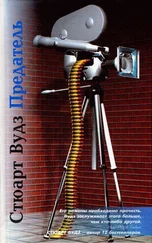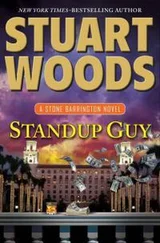Dame Felicity raised her glass. “I think we should have a congratulatory toast to Stone Barrington, who has just become a deputy director and special adviser to the United States Director of Central Intelligence.”
Stone was, at first, stunned, until he remembered that Felicity always seemed to know everything before anyone else.
Stone thanked them. “The appointment is only about two hours old,” he said. “Dame Felicity continues to astonish me with her knowledge of all things.”
“I’d understood that you were a lawyer, Stone,” Tim Barnes said.
“There is no change in that regard,” Stone replied. “I’ll continue to be based in New York and remain active with my firm.”
“What will you advise the director on?” Pink asked.
“That remains to be seen,” Stone replied.
“Of course, you must be secretive about that.”
“Not just yet, since I have not acquired any secrets.”
“I should tell you, too,” Felicity said, “if you don’t already know, that Holly Barker is a former director of Central Intelligence, and that she is, currently, the American secretary of state. Also, it is rumored, she might be soon announcing her candidacy for the Democratic nomination for president.” There was a round of quiet applause.
Holly bowed her head in acknowledgment, but said nothing.
The first course arrived and Felicity turned toward Stone. “Perhaps you have not heard that Brigadier Fife-Simpson has left Her Majesty’s service and taken retirement.”
Pink spoke up. “He declined a posting in the Falklands.” There were quiet chuckles around the table.
“I should mention,” Felicity said quietly to Stone, “that the commodore is a retired Royal Marine, and everyone here has signed the Official Secrets Act, so tales are not being told out of school.”
“I’ve met the brigadier only a few times, but I can understand that everyone involved is relieved,” Stone said, raising more chuckles.
“I hope to God that someone is keeping an eye on that fellow,” Sir Jeremy Pink remarked.
“Someone is,” Felicity replied drily. “He was most recently observed drunk, in the In & Out bar of the Naval and Military Club. After dinner, the doorman decanted him into a cab.”
“Somehow,” Pink said, “I feel the country is safer tonight.”
They finished with an excellent vintage port, with Stilton, then were offered brandy. Stone drank lightly, as he was driving the Hinckley.
On the way back across the Solent, driving more slowly in the dark, Stone explained to Holly who Brigadier Roger Fife-Simpson was.
“Every military or intelligence service attracts a few people like that,” Holly said. “I’ve known my share of them.”
“I’m glad you missed the opportunity of knowing this one,” Stone said.
“I heard from Lance about his visit to Langley and his encounter with Wu.”
“I’m sorry I didn’t get to see that,” Stone said.
Back at Windward Hall, Stone found a note to call Joan. His cell phone had been off for the evening, but it was late afternoon in New York.
“Well,” Joan said when Stone had raised her. “I’ve never known you not to carry your cell phone.”
“I’ve got a new one, and it hasn’t been activated yet.”
“We got a call from Lance Cabot’s office, saying that they want to install some equipment here tomorrow. What’s that all about?”
“Lance has asked me to spend more of my time consulting with the Agency. I’m called a ‘senior adviser to the director’ now. I expect that work will be a secure line to the Agency.”
“And a dedicated computer link, too,” Holly said.
“I heard that. Holly’s there, is she? My regards.”
Stone passed that on. “By the way, you will soon undergo a background check for a security clearance, so I hope there are no skeletons in any of your closets.”
“Not that they’ll ever find,” Joan replied.
“I wouldn’t count on that. You’ll have forms to fill out, so don’t lie about anything, even to protect me.”
“Who else knows about this?”
“Dino and Viv, but it’s not a secret. There won’t be a public announcement, so you won’t have to field any questions from the media.”
“The rumor is out there: I’ve already had calls from the Times and the Washington Post. I told them I didn’t know what the hell they were talking about.”
“You’ll have to apologize the next time they call.”
“Oh, all right. Anything else?”
“I’ll call if I think of anything. We’re going to bed now.” He hung up and turned his attention to Holly, burrowing under the covers.
“Another minute, and I’d have been asleep,” she said, reaching for him.
Brigadier Roger Fife-Simpson arrived at his usual pub, the Grenadier, in Wilton Row, as the five o’clock crowd had begun to diminish. He hated it when all the Millennials were jammed into the small bar after work; it was more pleasant in the early evening.
He sat down and motioned to Tom, the barman of many years’ standing, for his usual large scotch, and it was delivered.
“Brigadier,” Tom said, setting down the glass.
“Tom,” he replied.
They chatted briefly, then a woman sat down a stool away from Fife-Simpson. She tried to hang her umbrella on the bar, but it slipped and fell to the floor.
“Let me get that for you,” Roger said. He picked up the umbrella and handed it to her.
“Thank you so much,” she said.
“May I offer you a drink?”
She smiled. “Thank you. A gin and tonic, please.”
Tom brought the drink.
“I haven’t seen you here before,” Roger said. “Are you a local?”
“I’m a new local,” she replied. “Just moved into the neighborhood yesterday.” Her accent was straight, old-fashioned BBC — no detectable regional accent.
“Well, you’ve chosen the right pub,” he said.
“And the right neighbor,” she replied, offering her hand. “My name is Jennifer Sands.”
“Roger Fife-Simpson,” he said, taking the hand. She was blond, buxom, fair-skinned — late thirties, he thought. “Where did you live before?” he asked.
“In the country,” she replied. “Oxfordshire.”
“Did work bring you to London?”
“No, my work is portable. I’m a writer.”
“What sort of writing?” he asked.
“Fiction, mostly short stories for literary magazines,” she replied, “but I’ve started a novel.”
“A major undertaking,” he said, nodding sagely.
They continued that way for a few minutes. “Why don’t we adjourn to the dining room for a bit of supper?” he suggested.
“That would be very nice,” she replied.
He got them a table and menus, and they ordered.
“But enough about me,” she said. “What work do you do?”
“I’m recently retired from the Royal Marines,” he said. “As a brigadier general.”
“That’s impressive,” she replied. “Were you a commando?”
“In my extreme youth,” he replied. “My penultimate assignment was commanding the training academy for one of the intelligence services.”
“Which one? I get them confused.”
“MI-6, foreign intelligence.”
“So, you were training spies?”
“I was.”
“What did you teach them?”
“Everything from basic tradecraft to personal combat. It’s a very vigorous course.”
“How fascinating! You said that was your ‘penultimate assignment.’ What was your ultimate?”
“Deputy director of the service,” he replied, in a mock whisper.
“That must have been fascinating!”
“It was rather dull, if the truth be known, after all the action of my earlier years. Most of which I can’t talk about, of course.”
Читать дальше












